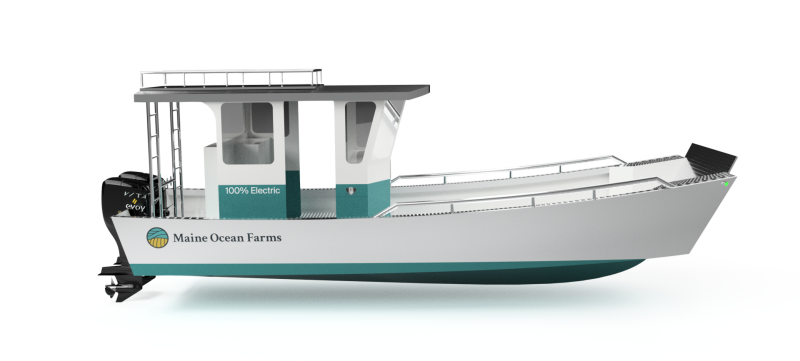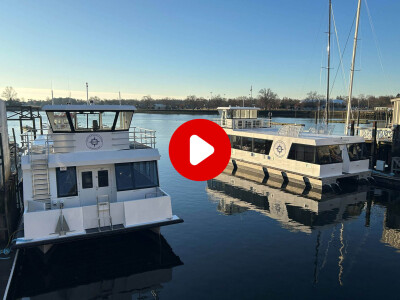Maine Ocean Farms, Portland, Maine, is introducing custom-built electric workboats to its operations. Two Aqua superPower DC marine fast charging stations will be installed in Harraseeket harbor, Freeport, Maine.
A statement released by Aqua superpower suggests this shift will be a new standard for eco-friendly oyster farming. A $500,000 grant from the US Department of Energy, Office of Energy Efficiency and Renewable Energy plus another $500,000 in matching funds has made this project possible, the statement said.
Aqua superpower highlighted it is leading this electrification project, in partnership with Maine Clean Communities.
Fogg’s Boatwoks, North Yarmouth, Maine, will design and build the custom-built welded aluminum alloy workboat, which will feature an advanced electric powertrain from marine technology company, Vita Power. Vita Power will design and manufacture the electric powertrain with suitable battery size and power output for the new fleet vessel.
The release highlighted the aquaculture industry’s 15% annual growth, noting oyster farming operations currently rely on gasoline powered workboats, generators, pumps, and processing equipment.
The statement suggested the addition of electric workboats and Aqua superPower’s charging infrastructure will drastically cut the operation's carbon footprint, helping to minimize noise, air, and water pollution, leading to healthier marine ecosystems and improved water quality.
“Maine Ocean Farms strives to continuously innovate our operations, embracing new technologies that can drive positive environmental change while supporting local economic growth,” Willy Leathers, director of farm operations and founding partner of Maine Ocean Farms said, “This project will demonstrate these technologies in action, providing data and real-time experience to other farmers and industry members.”
Scott Canning, vice president of U.S. business development for Aqua superPower first heard about Maine Ocean Farms when he learned the oyster farm co-developed a 100% compostable and biodegradable harvest bag to reduce marine plastic pollution.
“Once I met Willy and his team it became clear to me that Maine Ocean Farms was an ideal candidate for marine electrification. Electric propulsion makes the seafood supply chain more resilient and sustainable. However electric boats must be supported with a robust and reliable charging infrastructure, that’s Aqua’s part of the equation,” Canning said.
Sara Mills-Knapp, director of Maine Clean Communities, said the electrification of Maine Ocean Farms' aquaculture operations represents a significant step forward in reducing emissions and noise pollution in Casco Bay.
“The electrification of Maine Ocean Farms represents more than just a technological upgrade; it’s a pioneering model for the future of aquaculture,” Mills-Knapp said. “This project will demonstrate the viability of electric marine technology for the aquaculture industry. We expect it to serve as a model that can be replicated by other coastal operations, helping to build a more sustainable and resilient marine economy in Maine.”
As part of this project, the team will gather real-time data to measure environmental and emissions reductions. Collaborating with powertrain developer and manufacturer Vita Power, they will select the ideal system to transition vessels from ICE to electric. This project will showcase these technologies in action, providing a blueprint for other farmers and live data on their benefits.
The Maine Ocean Farm crew spoke to WorkBoat about operating the new vessel. “I’m looking forward to running these boats,” Mike Pauley, Maine Ocean Farm manager told WorkBoat. “It was only a matter of time until we brought electric into our operations. We have a 10-acre farm with over one million filter feeding bivalves cleaning the water column. Reducing our carbon footprint even further is the logical next step, aligning with our commitment to sustainability. Eventually, we’ll be running off solar.”




.jpg.small.400x400.jpg)
